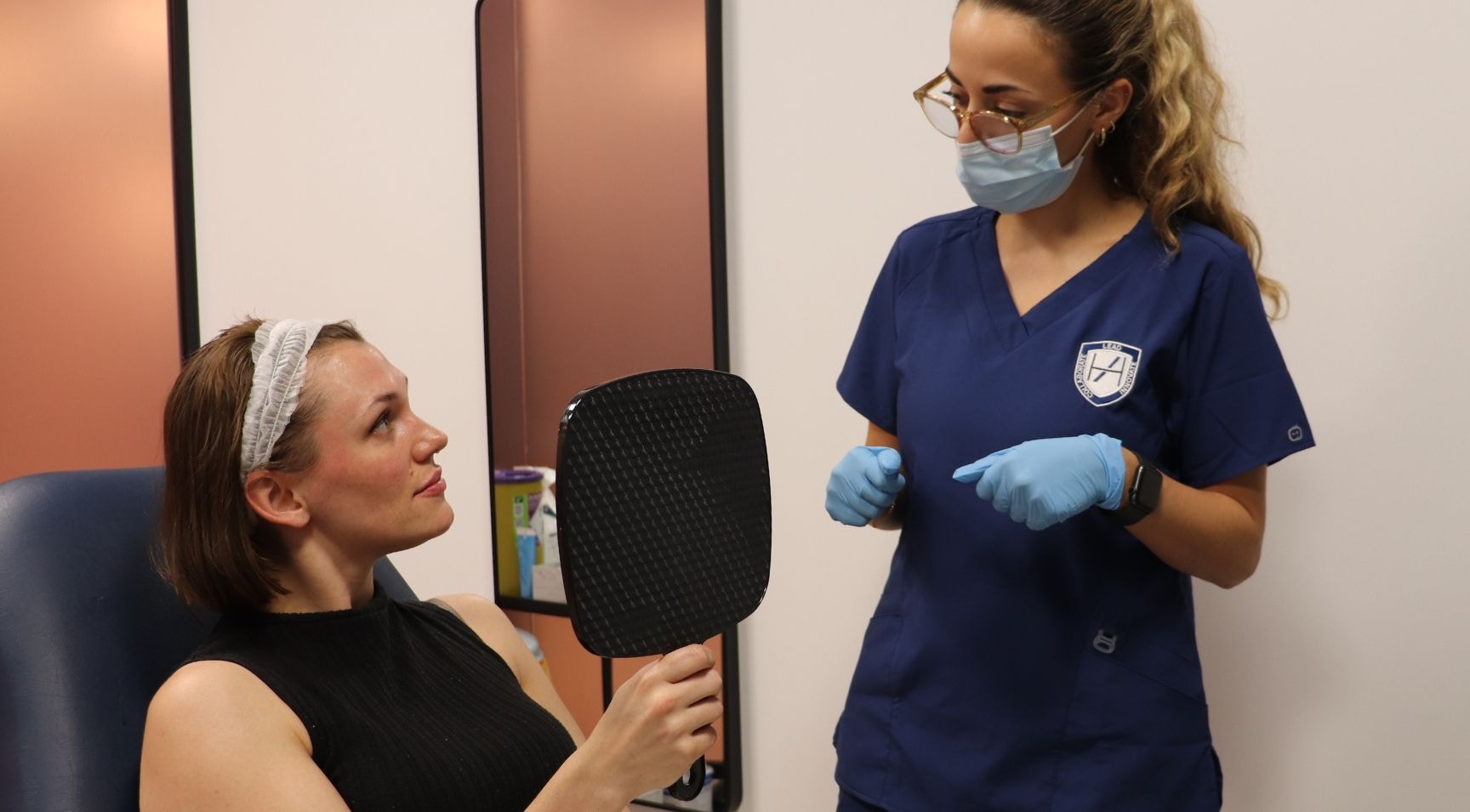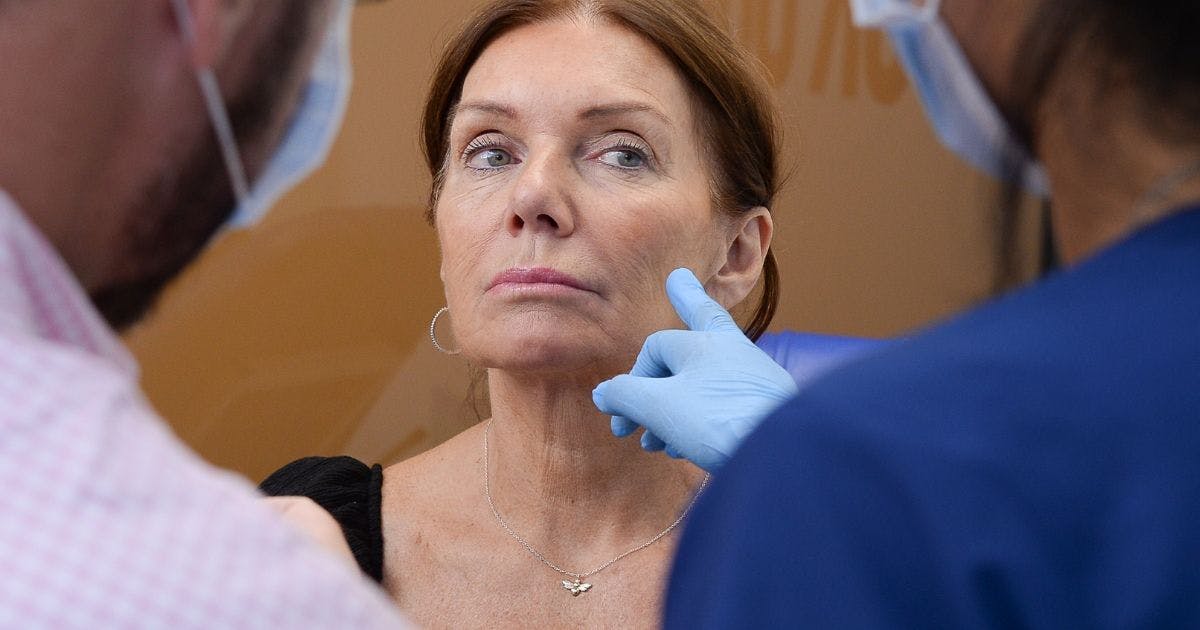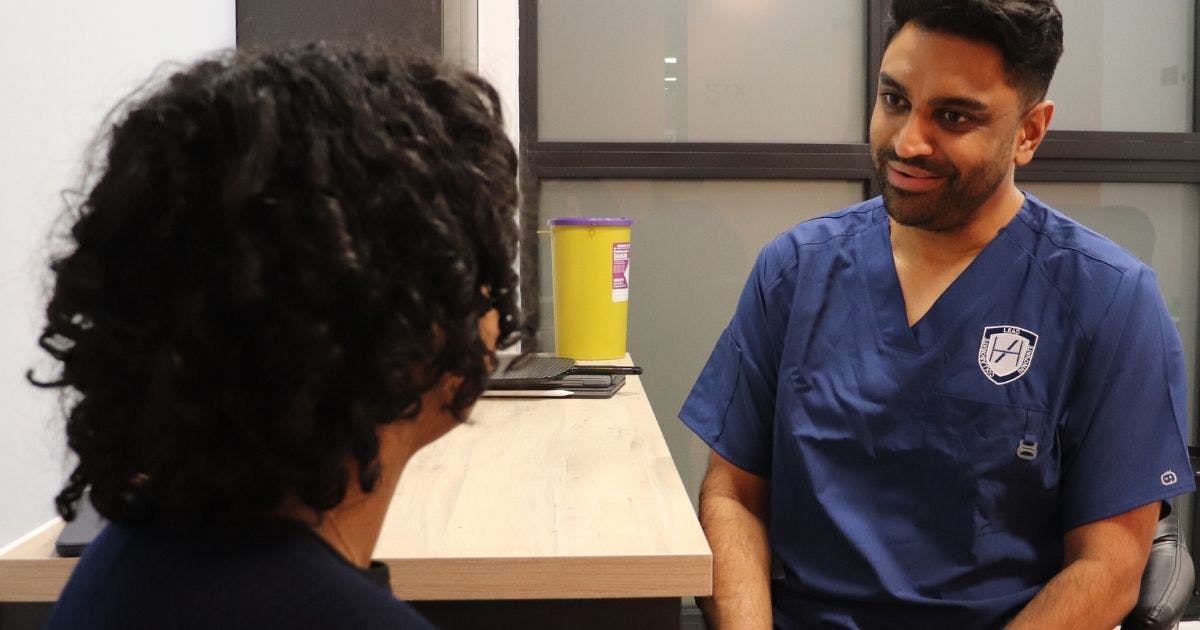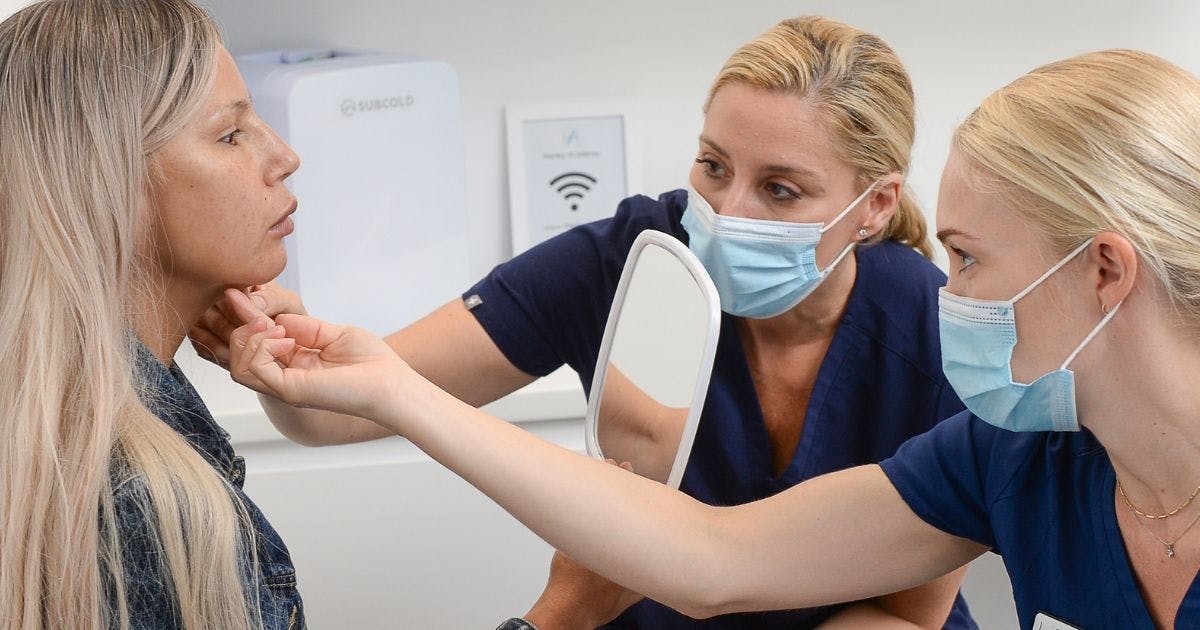Alice Hart-Davis & Dr Tristan Mehta on ‘Upselling’ Injectables

How do you balance upselling injectables with being an ethical aesthetics practitioner? It’s a skill new injectors should learn how to master.
You may have watched a social media discussion that touched on this very topic. Leading aesthetics journalist, Alice Hart-Davis brought it up to our founder, Dr Tristan Mehta.
At Harley Academy, we’re passionate about promoting ethical aesthetic practice. We also understand the commercial concerns of running a successful business. So, let’s examine what this means and how you can ‘upsell’ treatments in a principled way.

Not making aesthetics patients feel like they’re being ‘upsold’
As founder of The Tweakments Guide, Alice Hart-Davis is frequently asked questions about aesthetic treatments. Her following includes both patients and aesthetics practitioners, which makes for some interesting insights.
The following is an extract from a recent Instagram Live conversation on aesthetics regulation between Alice and our founder, Dr Tristan. It centred around how patients can easily feel as if they’re being ‘upsold’ treatments and lose trust in their injector.
Alice: “I get a lot of people asking me… they also often say to me that they feel they're being upsold. But it's a difficult balance there, I can see, for the practitioner.
“If you've got somebody who's 55 and has a lot of loss of volume in their face coming in just wanting their lips done or one set of lines done, there may be benefits to giving them a more overall treatment.
“But I feel, if that is explained properly to them, then they won't feel they're being upsold because they'll understand why the practitioner might want to do a bit more in order to give them the result that they're after. You know, you've always got people who come in wanting a tiny half a ml or something, to basically give the result of a facelift and then that has to be explained away thoughtfully.”
Dr Tristan: “If something sounds too good to be true, it often is. You [the patient] should probably have a few painful truths that you listen to. That means that your clinician's being pretty straight and honest with you. And, like with everything, it will take time to get to an outcome… If you want to skimp on time or money, that's when things go wrong.”

Aesthetics practitioners should not upsell injectables
To consider yourself an ethical aesthetics practitioner, you should not upsell injectable treatments. There are entirely appropriate ways you can further engage your patients, but upselling is not one of them.
Firstly, neither the terminology nor the practice of upselling is ethical in relation to botox or filler treatments. Let us explain why…
What is the definition of ‘upselling’?
The Oxford English Dictionary’s historical thesaurus offers the following definition of upselling: “The practice of selling something additional to or more expensive than the customer's intended original purchase.”
So, essentially, you’re making price-based decisions, rather than patient-centred ones. As an aesthetics practitioner, as soon as your shift moves away from the patient, your principles can be questioned.
This then becomes an ethical issue.
Some injectors offer buy 2 areas get a 3rd free on botox - is that ok?
No, it is not. Don’t compare your marketing to that of others. Thanks to the lack of regulation coupled with lax social media accountability, there are a lot of bad actors in this field!
This marketing tactic is illegal and could result in your medical licence being revoked.
Let’s break it down so you can understand why this type of promotion is not acceptable:
- Botulinum toxin is a prescription-only medication (POM)
- It is illegal to market or entice people into using POMs
- This includes giving toxin away free of charge or running special offers on treatment
- You are upselling here by encouraging people to have more treatment than they may want and/or require to achieve their desired results, even if they’re not paying extra for it
- In addition to being against Advertising Standards Authority (ASA) regulations, it is also against the law to run such promotions and entice people into cosmetic treatments in this way.
Where botox is concerned, if you provide botulinum toxin treatments, there are strict criteria you should adhere to regarding its promotion.

Can I offer discounts on additional mls to patients having filler treatments?
Technically you can but it all depends on the context. Let’s use the common scenario of a patient asking for cheek filler, to explain…
Example 1: Injector-centred cheek filler experience
A 32-year-old female patient comes in wanting cheek filler. She sees Injector 1.
Injector 1 asks the patient what treatment she’d like and the kind of look she wants to achieve. She says she’d like fuller cheeks.
Injector 1 asks her what her budget is. The patient replies that she will spend up to £250 as long as she gets the results she wants.
The consultation is friendly and quickly over with.
Injector 1 suggests treating her cheeks and her lips for £250 as this will be within her budget so why not get both done at the same time because “it’ll look great”.
The patient had never considered lip filler before so she says she’ll go away and think about it. Before she leaves, Injector 1 offers to drop her price a further £20 if she has it done today.
Example 2: Patient-centred cheek filler experience
A 32-year-old female patient comes in wanting cheek filler. She sees Injector 2.
Injector 2 takes a full medical history then asks what treatment the patient is considering as well as her goals. Next, they put on medical gloves and assess the patient’s face, touching her skin and looking at it from various angles.
The patient tells Injector 2 she wants fuller cheeks. Injector 2 asks her why and what her cheeks looked like when she was younger? The patient reveals that she feels she has lost a lot of fullness in her cheeks after losing weight. She says she’s worried that her cheeks are now sagging and it’s making the hollows under her eyes look worse.
Injector 2 talks the patient through the effects of volume loss. Showing her on her own face, they explain what is realistically possible to achieve if her goal is to address mid-face volume loss, under eye hollowing and prevent jowling.
Injector 2 further explains that, by treating the cheeks, as requested, she could see a lovely result in terms of volume restoration. This could also help to potentially delay jowl formation. However, by treating the mid-face - meaning the apex of the cheeks, the lateral zygoma and the medial cheek fat - she could also reduce the appearance of her tear troughs.
The cost implications of each option - the cheek treatment on its own, or the full mid-face treatment - are fully explained. Additionally, Injector 2 specifies that this does not have to happen today and could be done in stages if the patient decides to proceed. They then ask if the patient has any questions.
After having their questions answered, the patient leaves. The consultation took up the whole appointment time but they left feeling understood and informed about their options.

Do you see the difference?
In the first instance, the injector’s primary driver appears to be money rather than the patient’s wants or needs.
There is little questioning of her motive to establish if she is even a suitable candidate for treatment.
By offering an unrelated treatment for no specific reason other than the injector’s own aesthetic preferences, then enticing the patient into having treatment on the same day, Injector 1 comes off as unethical and untrustworthy.
Injector 2, however, gives a full consultation, exploring the patient’s motivation and checking they are mentally fit for treatment.
Their expectations are considered, and bespoke solutions, tailored to that individual’s appearance and goals, are recommended. Injector 2 explains why they are making these recommendations and shares their knowledge even though the consultation takes longer.
They ensure the patient knows the costs and feels they have all the information they need. Furthermore, they do not pressure them into making a decision.
If it was your face, which of these aesthetics practitioners would you feel most comfortable seeing..?
Is there an ethical way to upsell to aesthetics patients?
Injectables patients may be sensitive about the expensive nature of botox and filler treatments already. Trying to get them to spend more - especially if it’s on things they don’t feel they need - may mean you lose their trust.
Whilst we would always say no to upselling but yes to providing a patient-centric service that includes making appropriate recommendations, one area you can sell add-ons, is skincare.
If you want to build your business, additional revenue streams can help. These are generally skincare-related. Consider introducing skin treatments to your practice. This opens up your client base to people who aren’t interested in injectables, as well as your existing patients.
You can offer individual skincare products, skin treatment courses and build combined treatment plans to address common concerns more holistically. These types of services involve more regular contact with your patients, too, allowing you to build your relationships.
By becoming a ‘one-stop-shop’ for all their facial needs, you can form long-lasting, profitable and rewarding relationships. Not to mention reap the benefits of word-of-mouth referrals!
Our Combined Level 7 course is the perfect aesthetics training course for those of you looking to build an ethical business to be proud of! If you don’t believe us, just listen to trainee, Abigail, who’s completed the Cosmetic Dermatology Course aspect, and is now finishing up her Level 7 Diploma in Botox & Dermal Fillers.
To get personalised advice on the best aesthetics course to help you build a thriving skin and injectables clinic, speak to Christine Slater. Christine is our dedicated, friendly and knowledgable Support Consultant. She’ll listen to what you’re looking for from your medical career and provide personalised advice on botox and filler courses, cosmetic dermatology training, and the merged pathways available to you.
In addition to the bread and butter aspects of aesthetic practice, our Level 7 injectables courses also discuss the ethics and legalities of being an injector. So, in addition to obtaining a respected, Ofqual-regulated and JCCP-approved postgraduate level qualification, you’ll be able to give your patients yet another reason to trust you!
All information correct at the time of publication
Download our full prospectus
Browse all our injectables, dermal fillers and cosmetic dermatology courses in one document
By submitting this form, you agree to receive marketing about our products, events, promotions and exclusive content. Consent is not a condition of purchase, and no purchase is necessary. Message frequency varies. View our Privacy Policy and Terms & Conditions
Attend our FREE open evening
If you're not sure which course is right for you, let us help
Join us online or in-person at our free open evening to learn more
Our Partners














STAY INFORMED
Sign up to receive industry news, careers advice, special offers and information on Harley Academy courses and services

